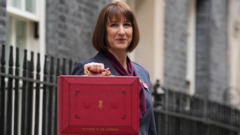What to Expect in the Upcoming Budget Announcement?

Published: 2025-09-16 04:40:47 | Category: technology
On 26 November, Chancellor Rachel Reeves will present the Budget, outlining the government's financial plans, including potential tax changes and spending decisions. With the backdrop of rising inflation and a slowing economy, Reeves faces pressure to navigate fiscal rules while honouring Labour's pledge not to increase income tax, National Insurance, or VAT for working individuals.
Last updated: 26 October 2023 (BST)
Key Takeaways
- Chancellor Reeves will deliver the Budget on 26 November, detailing tax and spending plans.
- Speculation surrounds potential tax increases or spending cuts to meet fiscal rules.
- Labour has promised not to raise income tax, National Insurance, or VAT for working people.
- The Office for Budget Responsibility will assess the economy's health and provide forecasts.
- Significant discussions on property tax reforms and other tax changes are expected.
Understanding the Budget Process
The Budget is a crucial financial statement made annually by the Chancellor of the Exchequer. It takes place in the House of Commons and outlines the government's economic plans, including tax adjustments and public spending priorities. The Chancellor typically presents the Budget speech around 12:30 PM UK time, following Prime Minister's Questions, and it lasts about an hour. This year, the Budget will be live broadcast on the BBC iPlayer and the BBC News website.
What to Expect from the Speech
In her upcoming speech, Chancellor Reeves is expected to address key economic issues, including:
- Tax measures: Potential increases or freezes on existing tax thresholds.
- Spending allocations: Funding for health, education, and public services.
- Economic forecasts: Insights from the Office for Budget Responsibility (OBR) on the UK economy's future.
Fiscal Rules and Financial Constraints
Chancellor Reeves has established two main fiscal rules, which she considers "non-negotiable." These rules are designed to ensure sustainable government borrowing and fiscal responsibility. However, recent assessments by the OBR indicate that Reeves has only £10 billion of headroom to meet these rules, a figure described as a "very small margin." This tight financial space raises concerns that the Chancellor may have to implement tax increases or spending cuts to adhere to her own guidelines.
Tax Thresholds and Stealth Taxes
One area of speculation involves the freezing of income tax thresholds, currently set to end in 2028. Freezing these thresholds effectively means that as salaries increase over time, more individuals will enter taxable income brackets, leading to what is often referred to as a "stealth tax." This approach allows the government to raise revenue without officially increasing tax rates.
Property Tax Reforms
Another significant topic expected in the Budget is potential reform of property taxes. Reports suggest that the government may consider replacing stamp duty—paid on property purchases—with a new property tax structure. This could also involve increased taxation for landlords and a reassessment of council tax. Additionally, changes to capital gains tax may be on the table, which could lead to taxing profits from selling primary residences in certain situations.
Individual Savings Accounts (ISAs) and Pension Changes
In July, Reeves ruled out immediate reforms to cash ISAs, which could have reduced the annual allowance, nudging individuals towards investing in shares. While such reforms remain a possibility, other measures to promote personal investment may take precedence. Furthermore, speculation surrounding pension rule modifications often arises ahead of the Budget. This includes potential changes to tax relief and the tax-free lump sum that pension savers can withdraw. Historically, chancellors have refrained from altering higher-rate tax relief due to concerns about making pension savings less attractive.
Broader Economic Context
The economic landscape in the UK has demonstrated signs of slowing growth, with the economy showing flat growth in July after a modest increase in June. The longer-term trend reflects a decline in economic growth, dropping from 0.6% between March and May to 0.2% in the three months leading to July. These figures indicate a tightening economic environment, compounded by rising inflation rates, which were reported at 3.8% year-on-year in July—above the Bank of England's target of 2%.
Interest Rates and Inflation
In response to economic pressures, the Bank of England cut its key interest rate to 4% in August, the lowest level in over two years. This decision aimed to stimulate borrowing amidst concerns of a weakening job market, as indicated by declining job vacancies and slowing wage growth. Lower interest rates can reduce the cost of loans, credit cards, and mortgages, but they may also lead to lower returns for savers, raising further questions about the best path forward for the economy.
Potential Tax Changes
Alongside broader reforms, specific tax changes have been suggested, including the removal of VAT on domestic fuel bills, which currently stands at 5%. Additionally, the Trades Union Congress (TUC) has advocated for increased taxes on online gaming companies and banks' profits. Such measures could help to boost government revenue while addressing public concerns about economic inequality and corporate taxation.
The Importance of Economic Growth
The Labour government has consistently emphasised the importance of boosting the economy as a key priority. An expanding economy typically results in increased consumer spending, job creation, and improved wage growth for workers. However, the recent sluggish growth figures raise questions about how effectively the government can implement policies to stimulate economic activity.
Conclusion
As Chancellor Rachel Reeves prepares to unveil the Budget on 26 November, the focus will be on balancing fiscal responsibility with the need for economic growth. With pressures mounting from rising inflation and slowing growth, her decisions will significantly impact the financial landscape in the UK. Will she find a way to generate revenue without burdening working people with higher taxes? The answer will shape the future of the Labour government's economic strategy as it approaches the 2024 general election.
#Budget2023 #UKEconomy #TaxReform
FAQs
What is the purpose of the Budget statement?
The Budget statement outlines the government's economic plans, including tax changes and spending priorities, and is presented by the Chancellor of the Exchequer.
When will the Budget be delivered?
The Budget will be delivered on 26 November, typically starting around 12:30 PM UK time.
What are fiscal rules?
Fiscal rules are guidelines set by the government to ensure sustainable borrowing and fiscal responsibility, often concerning budget deficits and public debt levels.
What changes might be proposed regarding property taxes?
Potential reforms could include replacing stamp duty with a new property tax and increasing taxes on landlords, as well as revising capital gains tax rules for primary residences.
How does inflation affect the economy?
High inflation can erode purchasing power, leading to increased costs for consumers and challenges for economic growth. It may prompt changes in monetary policy, such as adjusting interest rates.



